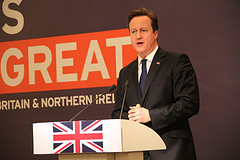21st February 2013
Mumbai: The PM has landed

Visits by the Prime Minister don’t come round too often to most FCO Posts, unless you happen to be in Brussels or Washington. Although I have met some “ex-PMs” in recent postings in Manila and Sydney, it’s more years than I care to remember when I was last involved in a visit by a current Prime Minister.

So the visit to Mumbai – and that too before Delhi – of David Cameron was a rare treat, and honour, for our office. It was the first visit by a British Prime Minister to Mumbai in 20 years, after John Major. It was made the more exciting, and challenging, by the gradual realisation that the accompanying business, academic, ministerial and parliamentary delegation was growing to well over 120 strong – the largest ever accompanying business mission with a Prime Minister overseas.
After some weeks of careful preparation we thought we had planned for every eventuality, until I got a call from the office around 0530 on the morning of the visit to say that the charter flight was running nearly an hour early! Later, the head of BP India – whose global CEO was on the flight with the PM – told me of his shock when he spotted from his balcony the distinctive Virgin plane on its final descent!
Our first stop was at the HQ of Hindustan Unilever. Thanks to some fast footwork by the Unilever team they were somehow ready for our arrival. Unilever must have one of the most impressive new offices in Mumbai, with a huge covered “Street” between two buildings, and it was during a meeting there in December with their impressive CEO, Nitin Paranjpe, and the High Commissioner James Bevan, that we dreamt up the idea of a visit by the PM.
He met over 300 of their employees, who weren’t shy in putting a range of questions from sustainability to his favourite Unilever product ( a question he ducked!) and education opportunities in the UK. They were left in no doubt of the PM’s commitment to seeing more well qualified students coming to the UK, and securing graduate jobs.
From Unilever the delegation were given an extraordinary journey into South Mumbai and their hotel with police lining the 20 km route, in an exercise I heard subsequently was personally supervised by the Traffic Police Commissioner Vivek Phansalkar from his control room. A journey which usually takes well over an hour was completed in less than half the time, to the astonishment of the four Ministers I was travelling with by coach behind the Prime Minister.

An hour later the Prime Minister spoke to a 300 strong-business meeting, underlining in a way which recurred throughout his visit in public and private meetings both his commitment to boost trade between our two countries and the openness of the UK to Indian investment.
Ratan Tata, the undisputed doyen of Indian business over the last 25 years, described how his conglomerate had benefited from its major investment with Jaguar LandRover, and found a great deal of support from the current British Government.
While the Prime Minister continued with private meetings with the heads some of Indian largest companies, and found the time to lay a wreath at the memorial to the police killed in the Mumbai siege and meet the Chief Minister of Maharasthra, the business delegation spread out over Mumbai for a series of meetings and visits on a sectoral basis.
An infrastructure group, for example, which included the CEOs or chairmen of some of the UK’s largest companies, like Balfour Beatty, Mott MacDonald and Arup, called on the Chief Minister, another group on the Health Minister, and a third were given a walk through Mumbai’s newest mall to experience affluent India with the head of the Biyani Group’s home products business Mark Ladham.

The infrastructure group heard from the Chief Minister about his plans for some major new transport links across Mumbai, and Transport for London initialled an MOU to co-operate on some of the developments.
Greg Barker, the Minister for Business Engagement with India, discussed UK plans to work with the Central and State governments on a new Bangalore Mumbai Economic Corridor, which Indian Ministers subsequently said at a conference was an idea whose time had come.
The six business groups eventually gathered back in South Mumbai and went with the Prime Minister to an event which marked two other aspects of Indian – British co-operation. BP and Reliance Industries announced during the PM’s visits plans for a further $5bn of investment on top of the $7bn already committed by BP for an upstream and downstream joint venture – the largest single overseas investment ever in India.
The two companies had also sponsored a very different event, with an exhibition of Egyptian mummies from the British Museum at Mumbai’s counterpart museum. In its delightful grounds, rarely open to the public in the evening, the Prime Minister, BP CEO Bob Dudley and Reliance Chairman Mukesh Ambani described how the jv and the Museums’ cooperation were yet further examples of the ways in which UK-Indian relations were getting broader, stronger and deeper.
The evening’s reception marked the end of the Prime Minister’s and his delegation’s whirlwind day of activity spread across Mumbai, beginning at the ultra modern Unilever building and finishing at the 1920’s designed museum, symbolising graphically the transformation in relations between our two countries.
The following morning the business delegation were off promptly at 6am, followed shortly thereafter by the Prime Minister, for their flight to Delhi. In my next blog I will describe how companies on the delegation are developing their business in India, and share some wider reflections on the impact of the visit.